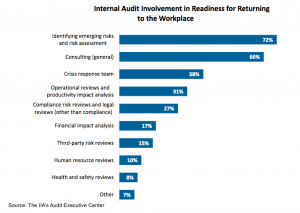
A new survey finds that while internal audit leaders have been involved in the planning for reopening their workplaces, as the threat from COVID-19 appears to lessen across the nation, many say their companies are behind on addressing several safety measures important to reopening their doors.
The poll of 371 chief audit executives (CAEs), conducted by the Institute of Internal Auditor’s Audit Executive Center, found low scores on preparedness across several steps companies are taking to accommodate new working conditions necessitated by the pandemic. For example, just 21 percent of internal auditor respondents say their organizations are “well prepared” or “very well prepared” to conduct testing of employees for the virus and only 42 percent say they are well prepared to make the modifications needed to provide “social distancing” among workers and customers.
CAEs also gave somewhat low scores to their companies on such factors as addressing illness or death liability (45 percent are well prepared), securing personal protection equipment (48 percent), and 56 percent say they are well prepared for contract tracing and informing employees who may have been affected.
Internal audit leaders say they are more prepared for implementing personal hygiene policies such as hand washing (79 percent well prepared), disinfecting the workplace (77 percent), and securing disinfecting supplies (63 percent.)
The preparedness levels, according to CAEs, also varied greatly between sectors. When asked, “How prepared is your organization to address factors for returning to work in the COVID-19 environment?” 65 percent of respondents in the manufacturing sector and 56 percent of those in health care said they were well prepared. Meanwhile, just 40 percent of CAEs in the education sector and 46 percent of those in the non-consumer facing services sector said they were well prepared.
Where Internal Audit is Pitching In
While CAEs admit their organizations still have much work to do to prepare to reopen offices, factories, offices, and other facilities, internal auditors are participating in the planning of the post-coronavirus business life. The survey found that 72 percent said they’re identifying emerging risks and updating risk assessments. Two-thirds (66 percent) of the CAEs polled said they’re performing consulting activities in preparation for organizations returning staff to the workplace, and 38 percent say they are participating on the crisis-response team.
 Still, few internal audit functions are performing reviews that provide for readiness to return. Only 8 percent of the respondents indicated they’re doing reviews related to health and safety, while 10 percent are performing reviews related to human resources, and 15 percent are conducting reviews of risk related to third parties.
Still, few internal audit functions are performing reviews that provide for readiness to return. Only 8 percent of the respondents indicated they’re doing reviews related to health and safety, while 10 percent are performing reviews related to human resources, and 15 percent are conducting reviews of risk related to third parties.
Known Unknowns
One of the more troubling findings of the survey was that many internal auditors replied that they were “not sure” about the preparedness of the organization on certain factors important to reopening. More than 20 percent of respondents weren’t sure on readiness for testing on both previous or current infections, 22 percent weren’t sure about preparedness for illness or death liability, and 16 percent were unsure where the organization stood on securing cleaning vendors.
“I find it troubling that too many respondents could not provide an opinion on the readiness of their organization for about a third of the factors examined,” wrote IIA president Richard Chambers in a blog post on the survey. “This signals that a large number of internal audit functions are on the outside looking in on some of the biggest risks facing their organizations. This is unacceptably high, considering risk assessments should have been updated to cope with the pandemic crisis.”
Chambers urges internal audit to step up work to get to the next phase of how companies are dealing with the crisis. “As our organizations’ last line of defense, we cannot afford to be left out of efforts to manage key risks, especially during a crisis,” he wrote. “It is not too late to alert management and audit committees about the value that internal audit can bring to health and safety reviews ahead of a return to the workplace. I urge all practitioners to do so and be prepared to deliver that value.” ![]()
Joseph McCafferty is editor & publisher of Internal Audit 360°

